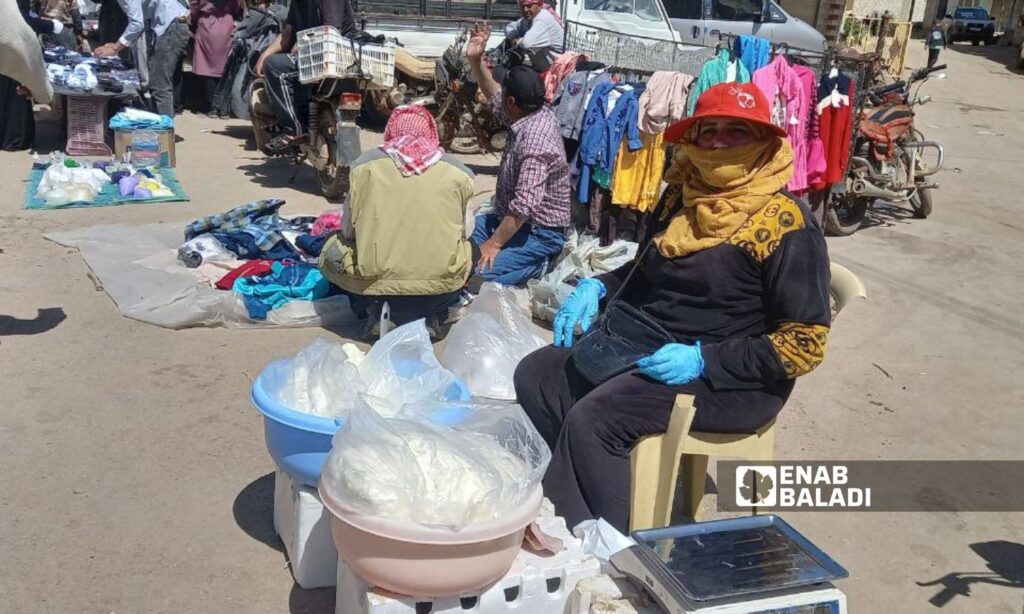Daraa – Halim Muhammad
Women in the western countryside of Daraa practice dairy product making from milk and cheese to provide additional income that helps cover household expenses.
This industry has seen a decline in sales this year due to the high prices of these products, making them less in demand compared to previous years.
The prices of dairy products have doubled from 2023. The price of a kilogram of strained yogurt ready for storage has reached 75,000 Syrian pounds, up from 35,000, the price of a kilogram of Arabic ghee has increased from 65,000 to 125,000 Syrian pounds, and the price of cheese to 35,000 Syrian pounds.
This price hike has coincided with a decrease in household incomes and an increase in the prices of most goods, turning these products into secondary items for many families, after being essentials in every house in Daraa.
The US dollar is equivalent to 14,800 Syrian pounds, according to the S-P Today website specialized in exchange rates and currencies, while the minimum government salaries in areas controlled by the Syrian regime amount to 279,000 Syrian pounds.
Milk and gas as reasons for high prices
Faten (30 years old), who makes dairy products at her home in the western countryside of Daraa, told Enab Baladi that her sales have halved this season. She sells strained yogurt ready for storage, kishk, cheese, and Arabic ghee.
She added that she is trying to achieve an income that helps her family, as her husband works in temporary agricultural jobs, attributing the slowdown in her sales to high prices.
She mentioned that these products are linked to the price of milk, which has reached 5,500 Syrian pounds, while it was 3,000 pounds in 2023. Also, the prices of household gas have risen almost three times, as the price of a gas cylinder in the local market reached 350,000 Syrian pounds.
The lady is currently working based on customers’ orders, as they pre-order the quantities, indicating that some residents are looking for a reliable source for making these products, because dairy products are subject to adulteration in the market.
Ways to reduce costs
Nahed resorted to cooking milk on the stove using discarded tree branches from pomegranates, olives, grapes, or dried cow dung known as “jilleh.”
Nahed (35 years old) said that by this method, she saves the cost of gas, but she suffers from the difficulty of lighting the stove and keeping it lit, bearing the smoke emissions that have started affecting her health.
She added that she is looking for any way to reduce production costs to secure additional income, so she resorted to saving gas usage.
Nahed has a cow that produces about 15 kilograms of milk daily, which she uses to make its derivatives, saving her the cost of buying it from the merchant.
In 2023, Nahed used the production of two cows in making dairy products, but she settled for the production of only one cow after the decrease in demand for her production, adding that making these products requires expertise and follow-up, which she gained from her mother.
Nahed makes kishk in May every year, as it needs a period of almost a month while it is spread on rooftops.
Every kilogram of kishk requires six kilograms of yogurt and one kilogram of bulgur, the price of a kilogram of yogurt reaches 10,000 pounds, and a kilogram of bulgur reaches 25,000 Syrian pounds.
Expensive feed
Nahed and a number of cow and goat breeders complained about the high prices of animal feed, as the price of a kilogram is 5,300 Syrian pounds, and a cow needs around 8 kilograms daily, which increased the prices of milk and its derivatives.
The vice president of the Dairy and Cheese Industry Association, Ahmed al-Sawas, denied in a statement to the Tishreen newspaper that the high prices of animal feed are the main reason for the increase in milk prices, as feed prices have decreased in recent months and it is widely available.
Al-Sawas attributed the rise in milk prices to two reasons: the first is the end of the sheep milk season in early May, which led to an increase in the demand for cow milk, and the second is the demand for fresh milk during the current summer season, especially from ice cream factories that prefer using fresh milk over imported powdered milk, whose price has increased due to changes in the exchange rate of the pound against the dollar.
The number of cows in Daraa is 43,264 heads, the number of sheep is 779,139 heads, and the number of goats is 119,054 heads.
According to a report by the World Food Programme (WFP) on February 12, about 55% of the population in Syria suffers from food insecurity, of which 3.1 million are severely food insecure, and the program estimated that 80% of the Syrian population in 2024 will need humanitarian aid.

